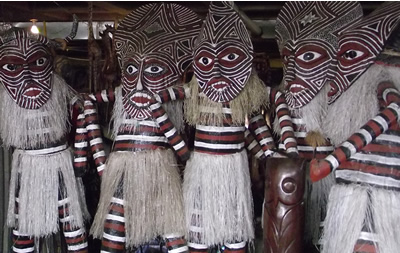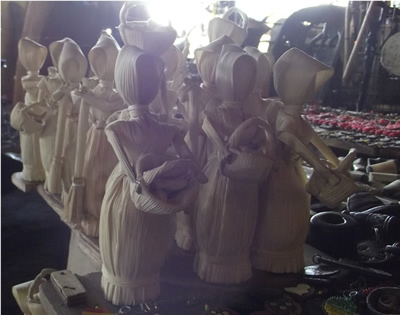Archive for the 'Uncategorized' Category
Is Jonathan Moyo an Evil Genius?
Friday, April 8th, 2011 by Upenyu Makoni-MuchemwaSince attending a SAPES Seminar last year where Jonathan Moyo presented on the topic NGOs, Donors and Zimbabwe’s Transition, I’ve harboured a deep suspicion that he is in fact an evil genius the likes which have only previously been seen in comic books as the antagonist to some super naturally inclined being, and mere mortals, like myself, don’t stand a chance against his superior intellect. Today Professor John Makumbe confirmed my suspicions:
I think he is insane. He has the capacity and the intelligence to expose the reality of ZANU PF, but he goes beyond that and makes ZANU PF more evil than it actually is. Instead of accepting ZANU PF, you are revolted by it as a result of what Jonathan Moyo has done to it. He has transformed it into a monster, literally. He is an intelligent guy, a brilliant guy…but anything he does, if he’s doing something good he will do it so well, if he’s doing something bad he will [also] do it well! When he loves, I think he loves fully, and when he hates, he hates totally. That’s Jonathan.
I never forget when he became Minister of Information and Publicity and the journalists were screaming… and he said ‘you ain’t seen nothing yet!’ and for sure, he banged them left right and centre.
If he is not managed, Jonathan Moyo will very easily ensure ZANU PFs demise … complete demise.
Obviously, I’m intrigued. If you are reading this Mr. Moyo, won’t you grant me an interview to either confirm or deny my suspicions?
Clean start
Friday, April 8th, 2011 by Bev ClarkWe need some people like Nuhu Ribadu in Zimbabwe. Our health care system is in tatters yet Mugabe gets the best medical treatment. His children are in the best schools. His house could house a thousand homeless. Here’s an interview from Monocle magazine . . . really worth a subscription.
Clean Start
Nigeria’s first anti-corruption chief Nuhu Ribadu was so effective he was sacked and fled the country, fearing for his life. Now he’s back running for president.
When Nuhu Ribadu launched his presidential campaign at the end of last year, he took to the stage clutching a broom. This was a symbol of his pledge to clean up Nigeria, Africa’s most populous country and the continent’s biggest oil and gas producer, where vast energy revenue have mostly been diverted into the pockets of the elite.
Ribadu says he is the country’s best chance for reform in an election due on 9 April (Since delayed to 16 April). Yet just one year ago, Ribadu felt unable to set a foot in Nigeria, let alone lead it. As the first head of Nigeria’s Economic and Financial Crimes Commission, set up in 2003, Ribadu had pursued corrupt politicians, civil servants and the country’s “419″ internet scammers.
But challengers to Nigeria’s “big men” are rarely tolerated for long. He was soon forced to take a year’s leave, suffered death threats and fled to the UK. He only returned home last year after the unexpected death of President Umaru Ya’Adua. He speaks to Monocle about his political ambitions.
Monocle: Nigeria is Africa’s giant, yet it is widely considered to fall short of its potential. What is holding it back?
Nuhu Ribadu: Corruption is at the root of everything. If the money that belongs to the state ends up in a few hands and is used for negative purposes, there will certainly be no money for development. Our presidential fleet has more than 10 aircraft, but the country doesn’t have a single good hospital.M: How would you reform Nigeria?
NR: I would be an honest leader. This is a very top-down place, where corruption happens simply because leaders are doing it. Second, I will open up the oil industry and follow the Extractive Industries Transparency Initiative. Third, I will clean up the justice system and police force and create laws to protect whistleblowers.M: Nigeria’s ruling People’s Democratic Party has won every poll since army rule ended in 1999. Is there any chance for opposition candidates like you?
NR: The PDP has never won a proper election and this year we are taking steps to ensure that you cannot steal elections easily. This is a real chance for the opposition and the country.M: How should the international community react if the poll is rigged? After the last polls in 2007, they criticised the widespread fraud but accepted the results.
NR: The time has come for the international community to insist that things are done correctly. If the outcome is not to their standards, they should not recognise the winner.M: How will you run a clean campaign in a political system that relies on corrupt god-fathers and sponsors? Will you probe your own backers?
NR: I’m not a policeman anymore. I’m trying to lead. So I won’t say that, if you donate a car to me, I’ll start probing and checking and saying I must know where you get your money. But that also doesn’t mean that I’ll take big money from anyone who brings it.M: Do you still fear for your life? What security measures do you take?
NR: It’s not my nature to travel in an armed convoy. I’m not 100 percent safe but neither is anyone who lives in a country like Nigeria. My situation is only a little worse than that of others.
Source: Monocle
Swimming with the fruit
Friday, April 8th, 2011 by Tina RolfeI was sitting watching TV last night, not for long mind, because there is nothing worth watching on a Thursday. And there is everything worth watching all at the same time on a Tuesday. If you are not the proud owner of a PVR you are either in an agony of indecision or in a fully-fledged-TV-remote-sharing fight on a Tuesday and forced into early retirement on a Thursday (even with the PVR). I was in bed by 7.
In the not-so-brief advertising break a particular ad caught my attention. Picture this: stunning brunette in skimpy bikini and tan, strides along white sandy beach, dives into azure waters, finds herself swimming with pears and other assorted fruit (underwater – no sign of fish). She chooses a pear and rises to the surface glistening with pearls of water, her hair artistically arranged (mine always clumps together, nothing “artistic” about it), smiles with her strong white teeth and suddenly disappears behind a box of Liqui Fruit. Yes I remember the product – sometimes I am so blown away by the advert itself that I couldn’t tell you what was being advertised – like the Schumacher/car advert where he drives on the ceiling of a tunnel – who can remember the make of the car?
I had to laugh. I said to my husband that I often take a dip on a hot afternoon with my fruit basket, and he should come home earlier, because I also leave the water looking like that … must be the pears.
By the way, my daughter wants a bar of Lux soap. She thinks it comes with the pretty sweeping pink dress in the advert.
Disappointment is just around the corner.
Zimbabwe’s Disability Arts Festival
Friday, April 8th, 2011 by Elizabeth NyamudaThe University of Zimbabwe’s Department of Theatre Arts and the Faculty of Arts, in partnership and collaboration with Student Solidarity Trust (SST) and the Disability Resource Centre (DRC) this week hosted the Disability Arts Festival. Under the theme: Navigating and Re-negotiating Marginality: Cultural and Artistic Dimensions. Academic presentations, poems and plays were presented during the week. Of essential mention is the presentation by Mr Masimba Kuchera from SST.
Mr Kuchera is visually impaired and his presentation investigated ways that impaired people can navigate the marginalities they encounter in their daily lives. The action plan is not one which requires one to be educated or academically advantaged but rather it draws itself from the natural attributes of any human being whether disabled or not. He presented a 5-point plan way of navigating and re-negotiating marginality from both cultural and artistic perspectives. A plan is vital in a negotiation process, as it serves as a yardstick. Negotiators are therefore desired to:
1. Refuse to be a hostage of the situation
Our society tends to model the way in which disabled people grow. For example some are denied their right to access education. It has become “normal” to see a disabled person not go to school. Thus there is need for disabled people to decline to be held into that ‘model’ and choose a different path.
2. Know their weaknesses and understand their strengths
It is important that disabled persons know their weaknesses and understand their strengths. In so doing, they are able to accept their disability and concentrate more on what they can do best.
3. Be patient
Patience is a virtue. This applies to anyone in general. When one is negotiating there is need for them to understand how the system works so you can be able to manipulate it for it to work to your advantage. And this can only be done when one is patient and takes time to learn.
4. Be confident and assertive
From a cultural perspective, elders are the ones who sit at negotiating tables ‘matare’ and make the final decisions or have the final say over a matter. In a scenario like this, the ideas and opinions of young people tend to be ignored. Likening it to disability issues, there are some people who negotiate for the disabled and at times they are the able bodied ones. It therefore takes confidence from disabled persons to not look down upon themselves and know that ‘disability does not mean inability’, for them to negotiate for themselves. After gaining the courage to have said something, one should be assertive and stick to what they said until it has been achieved. However, this confidence should not grow into arrogance, as a thin line exists between the two.
5. Ignore artificial ceilings
Break new ground, do the impossible! Pearson Nherera was the first Advocate who was visually impaired. Herry Gwala, became the first MP in Uganda who had disability. Paul Matavire and Stevie Wonder entered the music industry. Disabled people need to identify the artificial ceilings (which are usually set by the society) and choose to ignore them.
Disabled persons should work closely with partners. First, the State is obliged to work with them. Members of Parliament and policy makers and advocates should be able to put systems in place to assist this group of people. Second, the media should accommodate them, rather than to choose to ignore them. Through the media, arts and cultural activists raising awareness of the situation of disabled people will be given a platform to fill the gap of their non-existence.
For a long time have we seen blind beggars sitting at street corners. Everyday we see them begging at controlled intersections. Jairos Jiri, had a dream, and created a home for disabled persons. But over the years, we wonder and ponder what our government and the non-profit making sector have done to assist disabled people. But the fact that their numbers are increasing in the streets shows that more work has to be done.











